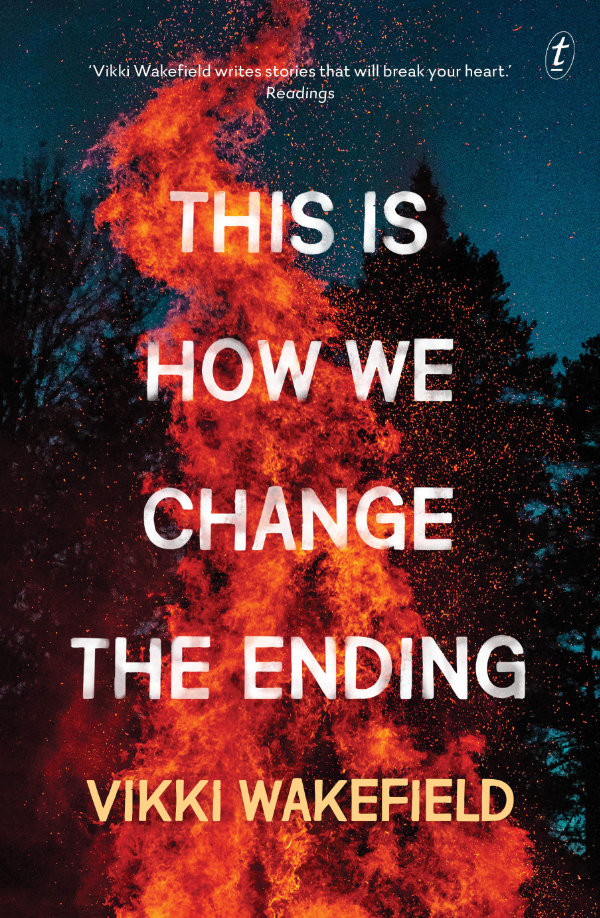This Is How We Change the Ending

Author: Vikki Wakefield
Publisher: Text Publishing
ISBN: 9781922268136
The publisher says...
Sixteen-year-old Nate McKee is doing his best to be invisible. He’s worried about a lot of things—how his dad treats Nance and his twin half-brothers; the hydro crop in his bedroom; his reckless friend, Merrick. Nate hangs out at the local youth centre and fills his notebooks with things he can’t say. But when some of his pages are stolen, and his words are graffitied at the centre, Nate realises he has allies. He might be able to make a difference, change his life, and claim his future. Or can he?
The author says...
The following are some of my favourite lines from This Is How We Change the Ending. They’re not the most beautifully written lines, but they were the most difficult to find—often short and deceptively simple, they carry the biggest ideas or the most emotional weight.
‘One minute Mr Reid was upright, yelling at Slater to shut up, telling me to sit down; the next he collapsed like a sandcastle—only the tide was us and our perfect disdain for anyone who drives an Audi but thinks he has the right to tell us our lives are shit.’ (page 19)
I had good relationships with just two teachers in high school. They had to work so hard for it, but I’m glad they didn’t give up on me because they made such a difference to my future. This is where the relationship between Nate and Mr Reid came from—initial antagonism, followed by mutual respect, ending with genuine trust and friendship. It takes an extraordinary teacher to interrogate their intentions and admit when they’re wrong, and to allow an equal balance of power and exchange of ideas. I know from experience that rudeness or disinterest is often a hurdle kids set up to protect themselves from being singled out, humiliated, forgotten, or erased.
‘—they’ve used Bradley Hand font on the signs, and I find it hard to believe a school with a coat of arms and a Latin motto doesn’t have a policy to prevent font-based judgements.’ (page 97)
I love this line but I confess it was unashamedly stolen from a teenager—a terribly disadvantaged teenager whose acuity never fails to astound me (and shouldn’t). I love it because it’s a subversive swipe at private education, and it blows up the assumption that lack of education equates to a lack of intelligence. I left it in because my first thought was that I should take it out—few would believe a teenager with Nate’s background would return judgement like that. But they do. So it stayed.
‘They’re free to save the world. The rest of us have to find our way out of the jungle first.’ (page 103)
This idea came late to the book but ended up being the thread that pulled the story together. In the beginning I struggled with having a main character who doesn’t exhibit the characteristics of a hero: Nate lacks power, agency, self belief and (some might say) likeability. I needed a way to show that power and agency are privileges of the traditional hero, and I had to convey that without it coming off like a lecture about class and disadvantage. Nate makes changes to his life despite lacking these attributes and that makes him a hero of a different kind.
‘I cross roads all the time and I’ve never been hit... I’m trying to remember who taught me: Mum, Dec, or neither. I decide it was more likely a few near misses and a school excursion to the Road Safety Centre in Grade Two.’ (page 150)
Again this seems like a flippant—even humorous—observation from Nate. But the underlying truth is many kids lack mentors and role models in their parents and families, and they must either rely on outsiders (teachers, for example) or take more risks to learn the life, social and survival skills we expect them to learn at home.
The CBCA judges say...
This is a raw, gritty story with plenty of compassion that will leave the reader with a sense of hope. The skillfully drawn setting, of a suburb in decline with locals suffering from acute poverty, adds another dimension to the initial apathy and hopelessness felt by the complex main character, Nate. The character development here is excellent. Nate is a smart boy beaten down by his circumstances, who has learned to hide his intellect and emotions. A deep love for his younger brothers, stepmother, and even his abusive father, is the driving force in demonstrating how the powerless can be powerful. Wakefield does not shy away from the realities of destitution and domestic abuse, both physical and emotional. Almost every character is flawed but Wakefield’s skill lies in creating empathy without resorting to sentimentality. The tone and pacing are pitch-perfect, and the story will encourage teenage readers to put themselves in someone else’s shoes. Ultimately, it is a thought-provoking and uplifting read.
Our Reading Time reviewers say...
Click here to read the Reading Time review
Teaching Notes for the book…
The publisher has generously made teaching resources available for this book. Click on the icon below to view these resources.
